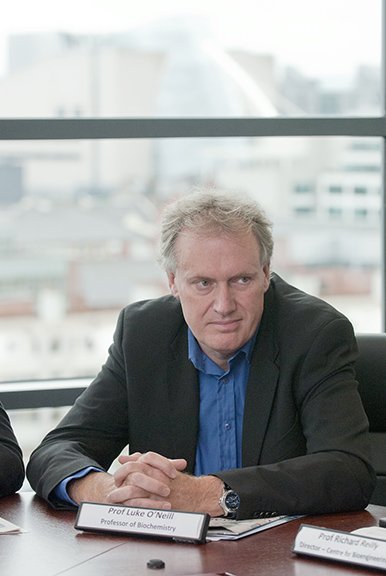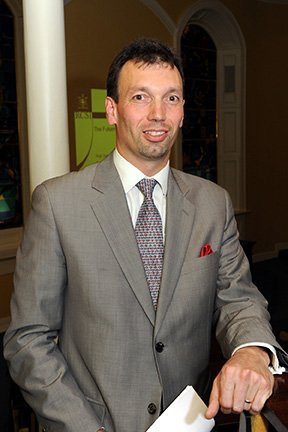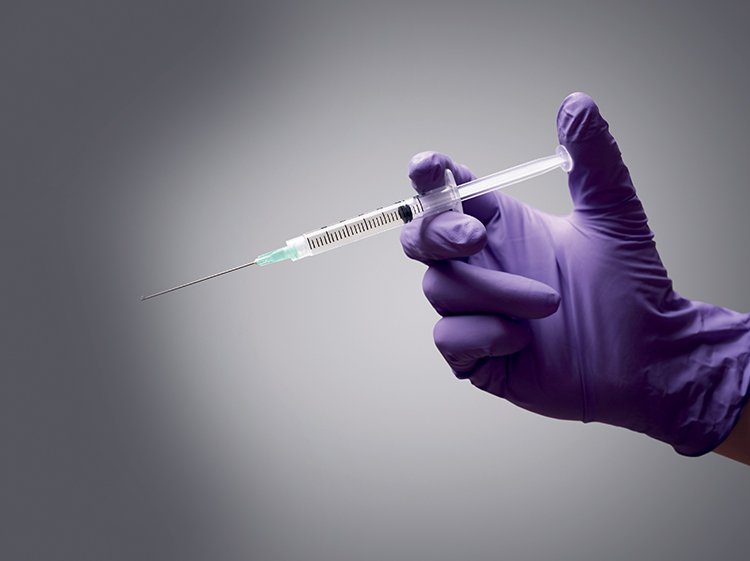As efforts continue towards treatments and a vaccine for Covid-19, a recent web conference looked at the funding and access challenges involved in the process. David Lynch reports
he search for treatments and a vaccine for Covid-19 is currently taking place across the globe, but challenges over access and funding are already being flagged by governments and NGOs.
“There are 41 companies developing vaccines as we speak,” according to Prof Luke O’Neill, Professor of Biochemistry in the School of Biochemistry and Immunology, Trinity College Dublin. Prof O’Neill was speaking on 7 April at the Access to Medicines Ireland (AMI) web conference titled ‘Covid-19 — Defending the public interest in vaccine and medical development’.

“There is great promise, great hope; we really believe it is going to work,” continued Prof O’Neill. “Ninety-nine per cent of immunologists say there is hope with this virus… It will take a year-and-a half at a minimum [for vaccine development].”
While the conference heard some optimism about the development of drugs (see panel), other speakers also highlighted the need to provide equitable access for any future Covid-19 vaccine and treatments.
In March, Costa Rica made a proposal to the World Health Organisation (WHO) to create a “pool” of intellectual property (IP) rights to tests, medicines and vaccines, with free access or licensing on reasonable terms for all countries to address the Covid-19 pandemic.
Speaking earlier this month, WHO Director General Dr Tedros Adhanom Ghebreyesus confirmed that he supported this proposal “and we [WHO] are working with Costa Rica to finalise the details”.
The Medical Independent (MI) asked the Department of Health whether the Irish Government intends to support the Costa Rica initiative. Without addressing the proposal directly, the Department spokesperson said “Ireland is strongly supportive of equitable access to medicines, vaccines and diagnostics, including in relation to Covid-19”.
“The EU and its member states, including Ireland, are pursuing innovative approaches to combating the Covid-19 pandemic, including co-ordinated research and development efforts, through the WHO and in partnership with other WHO member states and international organisations,” the spokesperson told MI.
Financing
The Costa Rica proposal was raised by some speakers at the recent AMI conference.
Dr Ellen ’t Hoen (PhD) is a lawyer who was the head of advocacy at Médecins Sans Frontières’ (MSF) access to essential medicines campaign for over a decade.
She is a member of the WHO expert advisory panel on drug policies and management and a researcher at the University Medical Centre at the University of Groningen in the Netherlands.
She told the online conference that Governments “need to attach conditions to the financing of Covid-19 technologies”.
“These technologies are currently under development but they cannot go to market in the ‘business as usual’ model.
“We need new norms, and we need to establish that these new technologies and tools are public, global goods. That is absolutely key. We need mechanisms to make that happen.
“This is why Costa Rica made a proposal to the WHO to establish an international Covid-19 pool. A place where intellectual property, data, knowledge, know-how, technology, software, you name it, can be shared by everyone to use, so that it can’t become the propriety of one country or to one or more corporations. This proposal is gaining significant support.”
Dr ’t Hoen added: “What it needs is more governments coming out in support of this and supporting the WHO in making that happen. While it is understandable that governments today are focused on domestic needs, they need to come out of their somewhat nationalistic shell and work in global initiatives, because no country can do this alone.
“We need new norms. Covid-19 tools will have to be global, public goods. The IP knowledge and know-how needs to be shared and that needs to be reflected in the conditions for funding that is currently being spent on these new tools.
“What is important is as all this work is going on, that we also think of the access once products become available. If we postpone that work and the design of the mechanism that is needed at a global level until those tools become available, we will be too late. That will require political action, and that is a challenge when governments are very focused on the immediate domestic needs.”
In terms of the response of industry, MI asked the Irish Pharmaceutical Healthcare Association (IPHA) what measures the Irish Government could currently take to help to encourage vaccine development.
According to its spokesperson, IPHA is working closely with the Government to ensure “innovative medicines remain available to patients in Ireland”.
“Individual companies are engaged in extensive work to develop a new vaccine.”
EU
Other speakers at the conference raised concerns about the international reaction to the Covid-19 crisis.
“I think in the last number of years there has been a tendency towards nationalism in several countries,” Prof Samuel McConkey, Associate Professor and Head of the Department of International Health and Tropical Medicine, RCSI, told the conference.
“And unfortunately, the responses of many countries to [the] coronavirus has been to put up barriers and walls and to act in a more nationalistic way.
“That is partly because of [the fact] our health services in Europe are organised at the level of a nation state and are not co-ordinated in a detailed way across the EU.

“But one thing I think we need to promote is multilateral decision-making and responses to this… this is a threat in my view to the actual existence of the EU because it may affect different parts of Europe differently… I think this [multi-national solidarity] has been lacking at the EU response. We also need to stick in solidarity with low- and middle-income countries.”
Prof McConkey highlighted the work the Irish State does with developing countries through Irish Aid, and he said this work must continue.
Shortages
The conference was also addressed by Dr Andrew Hill, Senior Visiting Research Fellow in the Pharmacology Department at Liverpool University, UK. He raised concerns over the strain that the current crisis was putting on the supply chain of “basic generic drugs” and made reference to “terrible shortages of really basic antibiotics and anaesthetics” recently in hospitals in France, the US and elsewhere.
He added these shortages were caused because “the supply of the [drugs’] basic raw ingredients were shut down in China for eight weeks. Then a lot of drugs are sent from China to India to be formulated. Because it [India] went into lockdown, transport started failing there. So you have got supply slowing down and you have demand that is now off the scale…you have got the perfect storm.”
The crisis will require Europe to take a look at the current supply chain and production of medicine.
“We need to think of local European production and security of supply,” said Dr Hill.
He said the current situation was creating “bidding wars for scarce supply of drugs. So you will just end up with some countries having massive shortages, while other countries are hoarding. It will need to be centralised.”
Dr Gaelle Krikorian (PhD), Head of Policy at the MSF access campaign, told the conference that there should be no patents or profiteering on Covid-19 drugs, tests, and vaccines in this pandemic.
An MSF Ireland spokesperson told MI that “MSF have been calling for no patents or profiteering on Covid-19 drugs, tests and vaccines, and the [MSF] access campaign has long campaigned on this issue more widely”.
MSF internationally has said it is “deeply concerned” about access to any forthcoming drugs, tests, and vaccines for Covid-19 in places where MSF works and in other countries affected by this pandemic. It is urging governments to prepare to suspend or override patents for Covid-19 medical tools by issuing compulsory licenses.
“Removing patents and other barriers is critical to help ensure that there are sufficient suppliers selling at prices everyone can afford,” MSF said in a recent statement.
Pace of development remains uncertain
While focusing on issues of patient access, the Access to Medicines Ireland (AMI) web conference also heard updates on vaccine development, as well as the impact of the pandemic on the Irish health service.
“The quickest way to develop a scientific intervention for something is to re-profile an existing registered medicine,” Prof Samuel McConkey told the conference. He said that another way would be if there is a medication “already on the shelf” suitable for use.
“[The] third possibility is developing new products. Unfortunately, you are looking at a three or more years’ product development lifespan to take something from basic chemistry into production and into clinical trials.”
Prof McConkey warned that the historic example of HIV drug treatment development could mean that the search for effective therapies for Covid-19 is “a long haul”.
“I am pessimistic we are going to have a solution to this technically in the next three-to-six months. I think we are looking at two-to-three years for a possible vaccine,” he added.
In terms of vital research that is needed now, Prof McConkey said: “I would broaden the research to behaviour. How do we help people to wash their hands, to stay isolated?
“How do we help hospitals and nursing homes to prevent transmission? What do we have to do to help asymptomatic spread and pre-symptomatic spread? There is a lot of medical research [needed] that involves the distribution of products such as gowns, gloves and masks and so on.
“At a research level, I think research on behavioural modification factors and appropriate use of gloves and gowns and masks will be helpful. So looking at, within a nursing home and within a hospital, what techniques and technologies are better for helping to use PPE? What we need is almost behavioural change studies.”
Pressure
Speaking on the particular pressures facing doctors working through the Covid-19 pandemic, Prof McConkey said “the challenge is we are trying to look after sick patients, and trying to reorganise our whole hospitals, and some of us are also doing a lot of public media and even political briefing and then at the same time with those four jobs, you are also trying to design good research trials.
“So in the middle of all this, it has been challenging to try and get good research trials.”
Prof Luke O’Neill told the online conference that despite the current challenge, scientific rigour would have to be maintained. He said there was “a frenzy of activity” when it came to Covid-19 and vaccines, antibodies, antivirals and anti-inflammatories.
“There is a big spotlight on politicians and on healthcare workers and the big job they are doing. The scientists, of course, are also being scrutinised,” said Prof O’Neill, “mainly because stupid studies are being published, which must be looked at. The rules of engagement have changed. A lot of pre-published stuff is coming out un-refereed and that’s a concern to us all. This can be justified because it is an emergency, but equally, the standards and rigours of science are not being met in many of these studies.
“So the scientists are being looked at — what scientists are saying is being looked at, including people like myself. But it is difficult for us, because there are no definitive answers and scientists just give probabilities in the end. People, of course, don’t want to hear that — they want a clear answer.”
Spotlight
Prof O’Neill also predicted that the Covid-19 pandemic would alter the world of pharmaceutical development.
“I think this is the biggest spotlight ever shone on pharma,” he said. “I suspect the pharmaceutical sector will change radically as a result of this… in the case of pharma and biotech and drug-pricing, this has to be a good development.
“There are 41 vaccines being tested, 23 anti-inflammatories as we speak, in trials, and then I think six antivirals at the moment. All rushing forward. Let’s not lose our scientific vigour and the standards we have to apply scientifically.
“You can take short-cuts a little bit in an emergency, but you have got to apply the ‘bog standards’ that we have for drug discovery and vaccine development, with safety and efficacy. Antibody therapy is looking promising as well. We remain optimistic, but we need to maintain the scientific rigour.
“I know every immunologist is eating, breathing and sleeping Covid-19 at the moment. All our research is relevant here. Who knows who is going to crack this; it could come from anywhere. There are great ideas among Irish scientists as well.”
Weblinks: The full Access to Medicines Ireland web conference, titled ‘Covid-19 — Defending the Public Interest in Vaccine and Medical Development’ can be watched at www.accesstomedicines.ie/recorded-web-conference.













Leave a Reply
You must be logged in to post a comment.